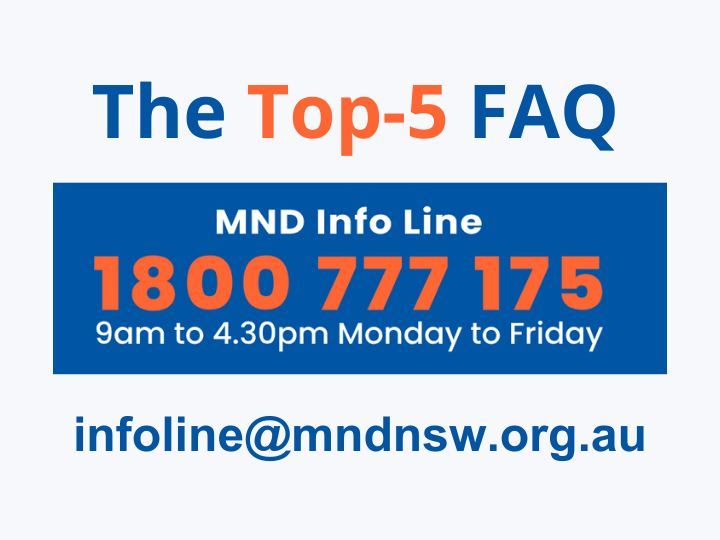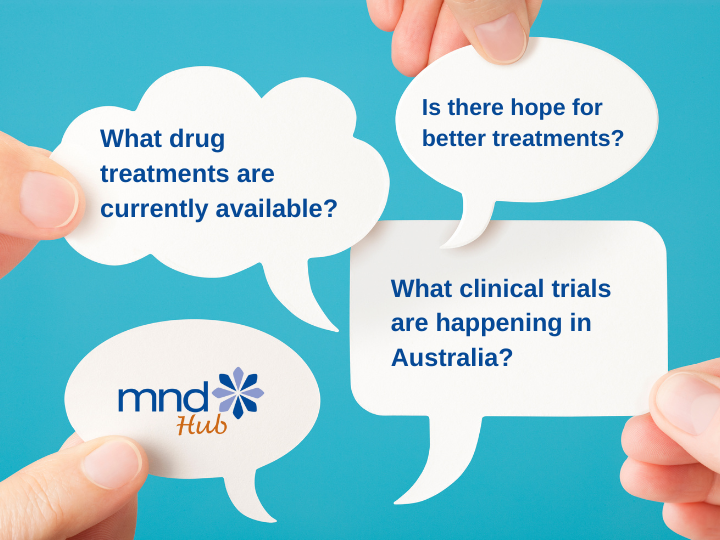Welcome to this month’s insights from the MND NSW Info Line! We have rounded up the top 5 questions we’ve been asked lately from across NSW, ACT and NT. From medications to nutrition, these are the answers you have been looking for.
1. What is Radicava?
Answer
Edaravone (commonly known as RADICAVA®) is now available on the Pharmaceutical Benefits Scheme (PBS). It is available for people diagnosed with Amyotrophic Lateral Sclerosis (ALS), the most common form of MND. It may slow the progression of the disease in the early stages.
It must be prescribed within the first two years from the onset of your symptoms.
Learn more about Radicava
If you are considering this medication, the best person to speak with is your neurologist. However, more information can be found in the links below.
- org.au/articles/radicava-new-treatment-for-mnd-listed-on-the-pbs
- Motor Neurone Disease Medication| MND Australia
2. How can I improve my nutrition?
Answer
MND can impact a person’s ability to maintain their weight and nutrition. This can be for a number of reasons. Some common reasons include weakness in the arms or hands, difficulty swallowing, fatigue or reduced appetite, amongst others. Being proactive about nutrition can improve your overall well-being.
Top tips:
- Prepare food and drinks that are easy to swallow or consider blending food.
- Fortify food with extra calories such as cream, butter, and healthy oils.
- Consider using lightweight cutlery or equipment such as robotic feeders to make eating less taxing.
Learn more about nutrition
Improving your nutrition is important to discuss with your healthcare team (including dietitian, speech pathologists, and occupational therapists) and carers. More information can be found in the links below.
- Maintaining Weight & Nutrition with MND
- Eating and drinking with motor neurone disease (MND) – Eating & Drinking Guide
3. Where do I find more information about the new Aged Care Act?
Answer
The start of the New Aged Care Act has been pushed back to 1 November 2025. This gives aged care providers and people accessing home care services more time to prepare for the changes.
Learn more about Aged Care reforms
Our MND Advisors are making sure they are across all the changes and how it may affect you. However, more information can be found in the links below.
- New Aged Care Act to start from 1 November | Australian Government Department of Health, Disability and Ageing
- About the new rights-based Aged Care Act | Australian Government Department of Health, Disability and Ageing
4. I have just been diagnosed with MND and I am struggling to come to terms with it. What can I do?
Answer
Nothing can prepare you for being diagnosed with MND and it can be an emotional time for everyone involved. Everyone reacts to this diagnosis differently, it is important to talk about how you are feeling.
Top tips:
- Break things down into small achievable steps and focus on one small piece at a time especially if you have limited energy or capacity at the moment.
- Consider reaching out to family, friends, or health professionals for support.
- Look after yourself by spending time on activities you find relaxing or comforting.
Learn more about mental health and well-being after an MND diagnosis
There are many ways to look after yourself. It is important to find what works for you. Accessing psychology and counselling support from the point of diagnosis is always recommended. More information can be found in the links below.
- Mental Health & Motor Neurone Disease | MND Australia
- Wellbeing resources and information - Black Dog Institute | Better Mental Health
5. How can I get involved with MND NSW?
Answer
Some people like to help by volunteering to be involved in MND awareness-raising, fundraising or administration activities. Others help by organising community events to raise funds for MND care, support and research.
Learn more about how to get involved with MND NSW
Do you have a question about MND?
Whether you’re newly diagnosed, caring for a loved one, or navigating the MND space as a health professional, we’re here to help.
Call us on 1800 777 175
Or submit and online inquiry at Contact MND NSW
“We can't do this alone. But together, we're unstoppable.”
MND Community Member



